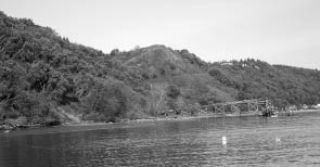CONSERVATION
Let me state as emphatically as can be conveyed in newsprint: The fight to protect Maury Island is not over. And far from being a last-gasp fight, our battle remains a strong one.
Yes, the Army Corps of Engineers approved Glacier’s permit, and yes, it is troubling that the Corps made this decision by ignoring their own science and without requiring an updated Environmental Impact Statement for this very complex proposal.
Still, this approval was not unexpected: the Corps denies less than one half of one percent of the nearly 90,000 permit requests it receives in the United States each year.
In upcoming weeks we will file an appeal of the Corps’ approval, and if it becomes necessary we will seek an injunction order to halt dock construction while the legal process proceeds. Rest assured, the courts do issue injunctions, and there is no reason to believe our request will not be granted.
It’s important to know that our upcoming legal challenges are not a rehashing of the land-use issues already determined by the courts and that we will be moving forward with challenges based on new issues and new information. As an example, Glacier’s proposed project and the actions of the federal agencies have never been evaluated in relation to legal compliance with the Endangered Species Act or the National Environmental Policy Act.
This is a new day for legal challenges to Glacier’s proposal, and we welcome the opportunity to call on the courts to provide oversight and wisdom the agencies have failed to present.
As for Glacier’s claim that construction could begin in August? We’ve heard statements like this from them before.
One problem with Glacier’s most recent assertion is that they seem to have forgotten that in addition to the weighty legal challenges ahead, they still don’t have all the approvals they need to build the dock.
Glacier has proposed to build this dock on aquatic lands owned by the state. To do this, they need a lease approval from the Department of Natural Resources (DNR), something DNR is under no legal obligation to grant. In fact, the last time Glacier applied, the lease was denied. While current political favor may be in Glacier’s court, it would be a mistake to think that an approval by DNR is an absolute slam-dunk.
At the reserve’s creation, a formal management plan was adopted outlining the goals and objectives of the reserve and defining what would be required of Glacier in order for DNR’s aquatic resources management team to consider approval of a lease request. DNR has told us that they will take all the time they need to fully evaluate Glacier’s proposal along with any evaluations and investigations necessary before making an independent determination on whether the lease would be in compliance with this management plan and above all, be in the best interest of the reserve. Certainly we will be vigilant in holding them to their word.
Much discussion has been made in recent years regarding current DNR Lands Commissioner Doug Sutherland’s oft-described “cozy” relationship with the mining industry and specifically with Glacier Northwest. While the commissioner adamantly claims this reputation to be unfounded, his actions often show a different truth. It is our hope that in upcoming days, the commissioner does not live up to this reputation and recognizes that the Aquatic Reserve is no place for an industrial dock and barging operation.
Glacier has plenty of options to mine sand and gravel in other areas that do not require the construction of industrial facilities in the middle of an aquatic reserve. In fact, the company has already been offered a mine site that has far more reserves than Maury and that would undoubtedly offer the company far more profit.
It would show strong leadership by the commissioner if instead of allowing DNR to approve a lease, he began to help Glacier facilitate mining operations on this or another more appropriate site.
As DNR proceeds with its investigations and decision-making process, it’s time once again to use our voices and make sure DNR listens to the community.
Visit our Web site’s “alerts” page at www.preserveourislands.org for more information on how to speak up and let DNR know your thoughts in support of orcas, salmon and the protection of the Aquatic Reserve.
Also know that in upcoming weeks we will send a letter to the community providing some detailed information on the legal challenge itself as well as an update on the recent decision by the Department of Ecology to list the Glacier property as a state hazardous site and what that means to the community. Make sure you open the letter; I promise we’re not asking for money.
Preserve Our Islands has been waiting and preparing for this leg of the battle that is now before us. Far from being naïve, we recognize the size and difficulty of this new fight. Still, we remain steadfast and confident as we move forward.
— Amy Carey is president of Preserve Our Islands.



